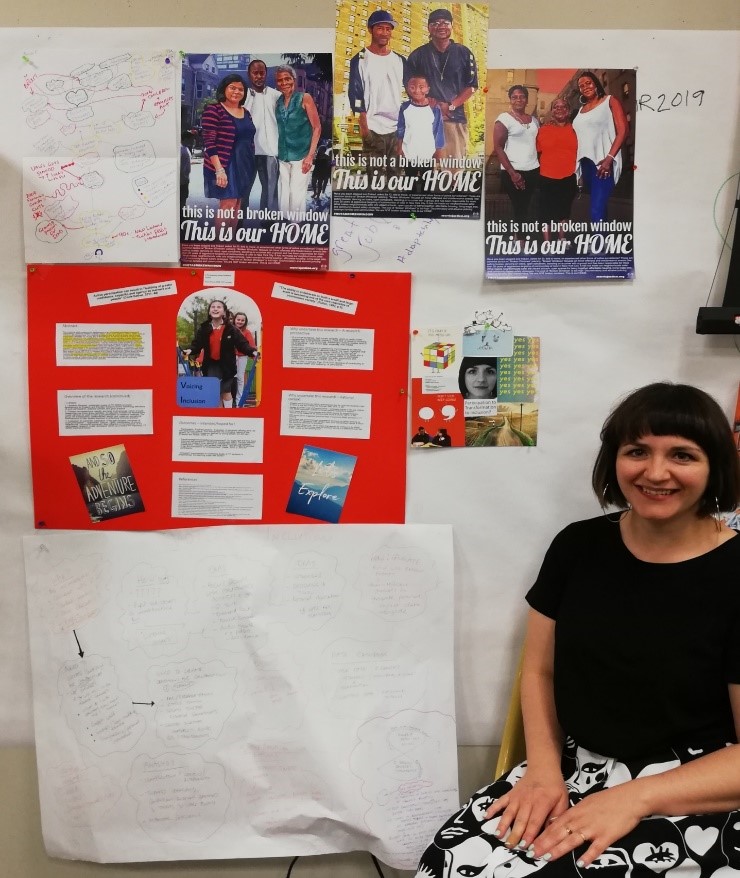In May 2019 I was hugely fortunate to have the opportunity to attend the annual, week-long Critical Participatory Action Research (CPAR) Summer Institute at the Graduate Center, City University New York .This highly-respected event, in its 9th consecutive year, is run by the Public Science Project. This is a community-engaged research subsidiary group of the Graduate Center and is led by eminent scholars in the field of CPAR – Michelle Fine, Maria Torre and Madeline Fox. I had found out about the event in late 2018 and knew that as a 3.5 scholar, it would coincide with the beginning of my time as a full-time PhD following completion of the PG Cert in Research Methods course I undertook as part of my studentship requirements. The focus of the event was to offer participants a theoretical and practical grounding in CPAR, through which they can reflect upon their own projects. As CPAR is my planned methodology, I felt that it would be an invaluable experience to work with world-leaders in the field to refine my PhD study in its infancy.
The week began with mapping the attendees’ knowledge and experiences via the participatory visual activity of creating a graffiti wall, wherein we wrote our thoughts under prompts and headings and added to the resource throughout the week in a living timeline of our learning and development. We discovered that participants had travelled from as far as the UK (me), Germany and Aotearoa (New Zealand). There was a wealth of academic, professional and practical expertise in the room and we were then grouped according to our research interests. My table comprised of attendees from across the US, all involved in the education system – other PhD students, established academics, educators, government officials and policy-makers. We spent the rest of Monday with introduction to the theory and history of CPAR from Michelle Fine and an overview of how to begin our projects and create conditions for collaboration by Maria Torre (the latter session had a particular resonance and impact on my project). I presented my own research to the group on the first afternoon as part of the Participant Project Museum. We had been asked to create a visual installation of our research to support this (see photos), rather than presenting in the standard format of a Powerpoint. The process of having to synthesise my PhD proposal into a poster and visual artefact was challenging but extremely useful, and has led me to adopting posters as a means of developing and refining my research. I now regularly try to visually map my research journey and have found it a fantastic tool for promoting reflexivity.
The rest of the week involved more theoretical training, interwoven with opportunities to undertake practical activities, which added to our arsenal of methodological knowledge. We conducted a project on perceptions of community, in which groups visited New York landmarks and either took photos, conducted interviews or ethnographic observation projects. My team visited the New York Public Library and conducted interviews on its steps, before visiting neighbouring Bryant Park. The data we collected then fed into a creative methods for participatory analysis workshop, in which we presented our findings via creating collages and embodied methodologies, namely participating in an immersive theatre experience led by Madeline Fox. The theatre activity was hugely inspiring. Participants felt that by data being translated into physical movement that their feelings had been captured in a very emotionally-stimulating way. This was indicative of the ‘safe but radical’ space that Michelle had promised we would create – we felt that we could try out activities that we may not have had the confidence to attempt previously. By the end of the week we realised that we had actually all been participating in a CPAR project ourselves within the room and could now truly empathise with the ‘bumps in the road’ we may face in our undertaking our own research projects. It culminated in each table bringing together our newly-developed expertise and presenting our group’s reflections. We presented our thoughts in a bricolage that represented the interconnectedness of the research journey, influenced by the philosopher Deleuze. Bringing in interdisciplinary thinking had not really occurred to me prior to CPAR 2019, but it has led me to further explore critical theory in other fields, particularly disability studies, in relation to Education and this has massively influenced the direction of my thinking in my PhD.

